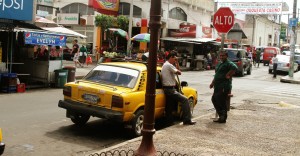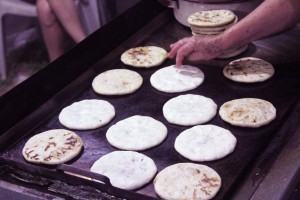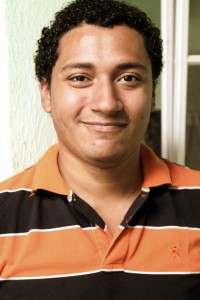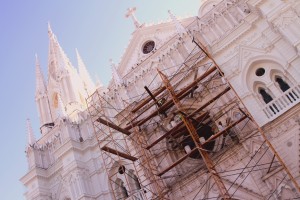To get to El Salvador is as easy as to Guatemala. We even didn’t get (now legally) any stamps as Guatemala, Honduras and El Salvador belong to one group, where you can spend your 90 days without a visa.

Pigios užkandinės, išsišiepę besišnekučiuojantys žmonės, lakstantys vaikai, policininkai su automatais – vaizdas išėjus į gatvę. | Cheep food restaurants, smiling chatting people, running kids, police with rifles – the view you get on the street.
At first we were thinking whether we should cross the country at all. Maybe the echo of the civil war (that of course finished 20 years ago), or maybe the level of criminality, didn’t look very appealing. However, some travelers advice us to go there. We think, it was one of the best decisions.
We quickly hitch El Salvadorian, who gets us into Santa Ana. Now, to the city we neither wanted nor needed to get to, but as soon as we passed the oldtown, we somewhat fell in love with it. Cozy small streets, colourful houses, white as a cake with snowy icing churches. Touristless streets. Great, we want to spend here some days. But where we are going to stay bearing in mind that we don’t do (only with exceptions) hostels. It’s not a beach or a small village where you can easily pitch a tent. While we were waiting for some answers for requests to couchsurfing site (www.couchsurfing.org), the evening came. We are off to hunt for a place to lay down in the darkness. One guy toterring around (clearly some substance misuse) and asking for something, few guys coming out of the car and staring at us suspiciously. It doesn’t help to think that you are in a safe environment.
On the corner few policemen armed in rifles. We approach them asking where would it be safe to pitch a tent. ‘Do you need a hotel?’ ask they. ‘No no, we don’t want to pay money. We have our tent.’ ‘Ah, ok’ it seemed that they understood very well what we mean. The offered city hall was not a successful try, but after the policeman in the police station called to his chief, soon we were offered a locked stadium as an option. And as we do not have our own vehicle, they offered us a pick-up. We could only imagine, whether anything like that would happen in Europe. Maybe. The guard at the stadium even wanted to show the stadium at night, he was very keen to know more about Lithuania. We slept that night safely and calmly.
Ernesto, our new couchsurfing host, at first got worried that we slept somewhere at the stadium, but after learning the story, he was happy to know that his country’s people are caring. In fact, sometimes to feel the atmosphere you need very little. To stay a moment in the square, to go by public transport, to eat in some local coffee shop. Some people are very unhappy. Some annoying. People in El Salvador – smiling, calm, there is some peace in their faces. They say ‘buenas’ to us and then give us a smile.

Papusas! Vietinis maistas – blyneliai su skirtingu įdaru (priminė žėmaičių blynus tik be bulvių ir mėsos ;D). Pigu, labai skanu ir ant kiekvieno kampo. | Papusas! Local food – pancakes with different filling. Cheap, very tastful and on every corner.
Maybe the recent civil war history taught to be kind to each other. Of course, El Salvador is not only an idyllic place the way we have just described. There is some heritage from the past, too. One of them is the gangs. In 1980 Los Angeles there were Latino gangs destroying each other. Bill Clinton has deported them back to Central America. So the suburbs got the bloody heritage. In the gangs people sometimes found and still are finding the lost family, they are very loyal (do they have a choice really as the only way to get out of the gang is the coffin), feel important. They tattoo their bodies and faces, and it is one way of recognising them in the streets. Do they have any goal? After having watched Christian Poveda documentary ‘La Vida loca‘ (Crazy Life esp.) it seems that there is no point of belonging to any group let it be Mara 18 or Mara Salvatrucha. Maybe protection. To be cool. But once you tattoo your face or body, the chances of getting a normal job are very low if possible at all. The police will be after you. Then of course, the robberies – to obtain some sort of income – is a popular way to ‘earn the way through’.
‘It’s not like in States’ Ernesto says, ‘where you can tatoo yourself and nobody will care about it. Here it will affect your job opportunities and your life, too’. In fact, the director of ‘La vida loca’ was also shot after the documentary was finished. In the last days of his life he was worried, that the pirate versions of the film might have been circulating among the gangs, and they were not too happy with how the film portray them.
In the documentary only jobless uneducated people featured, but in reality the problem is even more subtle as the professional people – lawyers, doctors, policemen – might belong to the gangs, too.
This surely is not only inheritance of USA, but also the state problem.

Ernesto – studentas, programuotojas, labai mielas žmogutis. | Ernesto – student, programmer, very nice person.
There is another wound, too. Even though during the daytime feels calm and normal: coconut seller offers fresh juice, the people rush to their jobs, students to universities. But just as fresh as twenty years ago the situation was different. The civil war affected nearly everyone. After having watched Luis Mandoki film ‘Innocent voices‘ (Voces inocentes), based on true story, you may picture what was the life like during the civil war. Even the current forty-year old at that time had his life in uncertainty and danger, because even twelve or ten year old kids were being taken to the army. USA at that time supported government with guns and trainings, and they were fighting against the left wing guerrilla. Kids were fighting at each of the sides. People were becoming animals, lots of victims and pain. When you see the moments like that, you think why the big countries think they have a right ‘to help’ when the only reasonable motive is ‘to stop communism’.
But let’s stroll around the streets in a lighter perspective. Clean colourful streets, looked after the army. In the evenings people come out to eat pupusas – a delicious pancake with a variety of fillings. Three pupusas cost one dollar (in El Salvador use USA dollars), and you have to be really hungry to eat more. The majority of street venders will offer you bean and cheese, but in other places a variety of ayote or mora (green veggies) or chicken will be on offer. Everyone was advising us to try pupusas – honestly, it is a delicious food.
We say goodbye to Ernesto as old good friends. Sometimes when you travel a couple day acquaintance might not develop into a profound friendship due to lack of time. But but this time we believe it will.
El Salvador is a small country with more than 6 million people. Even though the cities might be crowded they still have lots of untouched nature and wilderness. So if you up for a unoverhiked vulcano or unoverstrolled city, El Salvador might be an option. Yes, we had some anxiety, but relatively little. Hitchhiking was smooth, people friendly. You probably won’t be a frequent traveler here, but maybe it is for the best.

